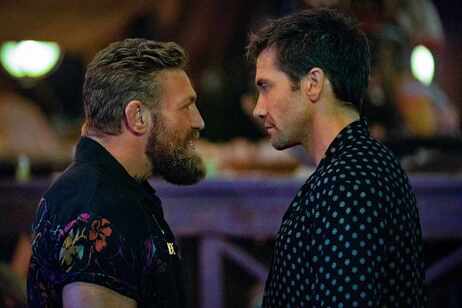C | A disgraced UFC fighter is hired as a bouncer at a rowdy Florida Keys bar. Directed by Doug Liman Starring Jake Gyllenhaal, Conor McGregor, and Daniela Melchior Review by Jon Kissel |

Liman is a far more experienced and accomplished director than Rowdy Herrington, who directed the original. With films like The Bourne Identity and Live, Die, Repeat to his name, this should be an easy task for Liman. He lives up to expectations in creating a sense of place. Road House was filmed in the Dominican Republic but that’s an easy ringer for one of the Florida Keys, and he finds some incredible tropical locations. In one of the film’s quieter moments, Dalton’s love interest Ellie (Daniela Melchior) takes him to what looks like the middle of the ocean for a picnic, when it’s actually a sandbar, and Liman does a casual panoramic shot around them to sell Dalton’s and his own astonishment that such a place exists, and is therefore worth sticking up for. The action also looks pretty good to me, though there are complaints from viewers with better senses of observation than me about CGI cheats in the fight choreography. I don’t understand how anyone could take a punch from McGregor and not immediately pass out. Those cheats seem like a must.
Road House’s other big strength is (some of) its cast, particularly Gyllenhaal in the lead. Since he moved away from blockbuster roles after Prince of Persia, his bailiwick has been intensity, embodied by his role in Nightcrawler. In Road House, despite his gentility and his calm manners, that intensity is always visible, and it makes him a more intriguing action star than his 80’s predecessors. Magnusson is also very good as one of the villains, self-consciously ill-equipped to live up to the status of his father, a character held off-screen for a possible sequel that writes itself. Brandt’s failed boatside shaving scene is a lot of fun, a suitable introduction for a character in desperate need of a comeuppance. As a goon in way over his head, Arturo Castro nearly steals the film by mirroring Dalton’s out-of-place affability. Below them in the competency rankings are Williams and Melchior, both fine in roles that have good bones but end up being underexplored, and the enthusiasm of the bouncers-in-training is an endearing trait. The next tier down is pure trash. A humanizing teen bookseller played by Hannah Lanier is a prime example of kid acting gone horribly wrong, while an enthusiastic bartender played by B. K. Cannon fails to come off as a real person. At the lowest ebb is McGregor, overacting in his first and, hopefully, only role. Like everyone in the world of the film, Liman clearly couldn’t tell him no.
It's absurd choices like all the ones that McGregor makes that keeps Road House from being anything more a mild entertainment. The backstory of the bar, established during Jim Crow by Frankie’s uncle, is a movie in itself and should’ve provided a hefty dose of fist-pumping righteousness. The strange sociology of the Keys is hinted at by Dalton when he asks why everyone, not just the people paid to be, is so aggressive here, but Frankie has no answer for him. Liman’s cinematic imagination stops at the edge of wakefulness, as the film talks repeatedly about all the weird dreams Dalton is having since he started sleeping on a boat. The viewer sees those dreams before Dalton insists on how weird they are, and it’s just realistic memories of the time Dalton beat his opponent to death in the ring. Nothing weird about that. I also reject a movie that lets a crooked cop walk away as a tolerable evil, no matter if he is the father of the love interest. That Road House can take all these shortcuts and still be just north of two hours is ridiculous. Liman has a reputation for messy productions, but that stays behind the camera. This is the first of his films where the messiness is onscreen. C
 RSS Feed
RSS Feed